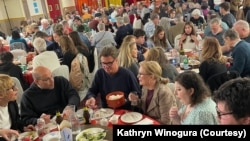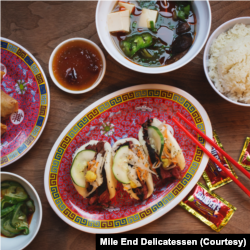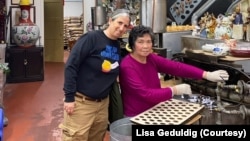The sweet sensation of fried shrimp egg rolls dipped in duck sauce. Steam rising from dumplings stuffed with chicken, ginger and cabbage. Smells wafting from a plate of General Tso's chicken on a bed of beef fried rice.
These are just some of the dishes coming from the kitchen of Miss Shirley's Chinese Restaurant on a packed Christmas Day in New Orleans, Louisiana.
On a holiday when most restaurants are closed so customers and employees can celebrate with their families, many Chinese restaurants in America are gathering places for the country's estimated 7.6 million Jews.
"Outside of these walls, maybe people are relaxing with their families, but inside these walls, it's a celebratory madhouse!" said Carling Lee, whose family owns Miss Shirley's and has owned and operated Chinese restaurants in and around New Orleans for more than four decades.
On Christmas and Christmas Eve, "we're slammed from 11 a.m. until 9 p.m. with people ordering takeout or dining in with groups of five, 10, 15 or even more," Lee continued. "It's friends and family, and we've even sometimes gotten three rabbis in here at once! Everyone's just looking for a way to enjoy the day off in their own special way."
The Chinese American Restaurant Association estimates there are more than 45,000 Chinese restaurants in the United States. For most that are open during the holidays, Christmas Day is the busiest of the year.
And although most American Jews don't know how this specific cuisine became so popular on Christmas, few doubt its ubiquity.
"Whatever the reason, you can ask pretty much any American Jew what they did on Christmas and their answer will be some version of, 'Ate Chinese food and went to the movies,'" said Sarah Wexler. "Even if they didn't, they'll still probably say it. It's that ingrained in our culture!"
The birth of a tradition
Food writer Jennifer 8. Lee explored the question in her book "The Fortune Cookie Chronicles: Adventures in the World of Chinese Food."
"Between 1880 and 1924, you had an estimated 3 million Jews coming from Eastern Europe, and an amazing 75% of them resided in the Lower East Side neighborhood of Manhattan," Lee told VOA. "It was a neighborhood that Chinese people already lived near and Chinese restaurants existed in, so you have these two massive immigrant groups living right beside each other."
Part of the Americanization process for those Jewish immigrants was going out to dinner. In the early 1900s, Lee said, Chinese restaurants were the place to go.
"Chinese restaurants were being portrayed in paintings and movies in the 1920s and '30s, and they were seen as sophisticated and cosmopolitan," she told VOA. "So if you were trying to impress a girl, for example, you'd bring her to a neighborhood Chinese spot, and you would appear worldly."
Convenient, 'easier to justify'
Rabbi Joshua Plaut is head of the Metropolitan Synagogue of New York and author of "A Kosher Christmas: 'Tis the Season to be Jewish." In addition to proximity and popularity, he says there are other reasons specific to Jewish immigrants that explain the popularity of Chinese food.
"For one, Jews coming from Eastern Europe had fairly strict dietary restrictions and as they acclimated to eating out in America, many had to come to terms with leaving at least some of those restrictions behind," Plaut said.
"Chinese food felt a little easier to justify because it didn't combine meat and dairy the way other common ethnic foods like Italian and Mexican do, and treif — which are non-kosher foods, like from pigs and shellfish — are more hidden in Chinese food," he continued. "Those ingredients are chopped up or obscured in a dumpling so if you don't see it, you can claim naivety. We call it 'safe treif.'"
Chinese restaurants were also open on Sundays.
"Historically, a lot of businesses were closed on Sundays because of the Christian calendar," Plaut told VOA, "but Jews were eager to enjoy the day. Chinese restaurants also had no reason to close, so Jewish families would go and enjoy dim sum. Similarly, when Jewish families were looking for someplace to eat on Christmas, Chinese restaurants were there for them again."
Hot food, warm welcome
Another reason some Jews say they feel connected to Chinese eateries is because they lack much of the religious iconography present at other restaurants.
"My family was always kind of uncomfortable around all the saints, crosses and crucifixions you find at Italian restaurants," said Laurie Sklar, a music teacher in Mansfield, Massachusetts. "But Chinese restaurants have always felt so welcoming."
Sklar said she's eaten Chinese food on Christmas Day for as long as she can remember, and that her parents did the same with their parents.
"We were on a first-name basis with the owner of our local Chinese place," she said. "He'd give us extra ice cream when we went. It felt like it was our special place, and to this day Chinese food feels as Jewish to me as matzo ball soup."
It's a tradition that, after more than a century, continues to grow.
"My 5-year-old son thinks Chinese food on Christmas is what we 'do' on Christmas, no different than fasting on Yom Kippur," explained Joel Tietolman, who runs Mile End Delicatessen in New York City, which has been celebrating December 24 and 25 with a special Chinese menu for 13 years. "It's truly become part of Jewish identity in North America."
Kung Pao on Christmas
Across the country in San Francisco, California, Lisa Geduldig has hosted the Kung Pao Kosher Comedy show during the Christmas holiday season since 1993.
Thousands of guests attend the show over several nights at the Imperial Palace Restaurant, featuring a Chinese food banquet and Jewish comedians.
"It's a place for those who might feel 'other' during the Christmas season to gather together as a community and celebrate in a secular way," Geduldig told VOA. "We've had Jewish guests who have been coming for decades, but we also have non-Jews who are looking for something fun to do and don't want to be alone on Christmas."
That otherness is something both American Jews and Chinese Americans can relate to during the country's biggest religious holiday. Hillary Saunders, an environmental scientist in Albany, California, admitted it was a familiar feeling for her as a child.
"Growing up I felt very lonely on Christmas. I remember the constant Christmas music made me feel so isolated," she said. "But knowing that Jews have this tradition, too, that you can go into a Chinese restaurant and find others doing the same thing — it's comforting."
"For Jewish people, every holiday has a food associated with it," Saunders said. "For me, Christmas tastes like Chinese food."






